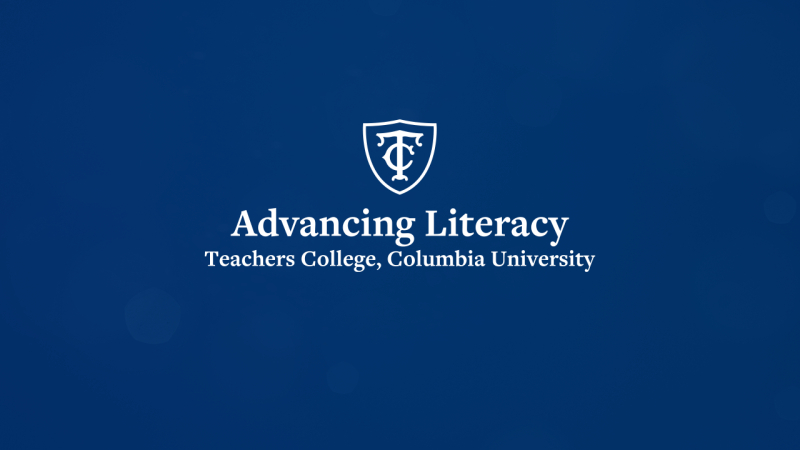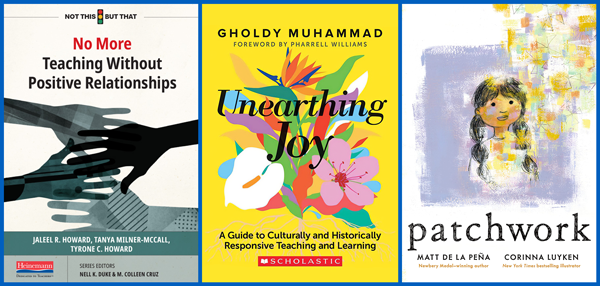
Our Work Continues and Grows with a New Name and a New Year
Published Monday, September 4, 2023
Mary Ehrenworth
If you’re an educator, you live and breathe by a school calendar. The start of school is our New Year's Day. At Advancing Literacy (formerly TCRWP), we live by the school calendar too, and this is the time when we think creatively about teaching and learning, as we embark on a year of hosting institutes, doing PD in schools, researching in study groups and think tanks.
When I was writing my dissertation, one of my most powerful mentors at Teachers College was Maxine Greene. Teaching, for Maxine, was about imagining possibility. Maxine’s words remind me that our work, as teachers, is to orient ourselves to the possible. In “Imagining futures: The public school and possibility,” Maxine wrote that “teachers must think about what is involved in inventing the kinds of situations where individuals come together in such a way that each one feels a responsibility for naming the humane and the desirable and moving together to attain them” (2000a, p. 274).
How beautiful, to position our work as striving to increase our common humanity. That ethos helps me to embrace some positions and to reject others in my work. It may help you. I think, as I consider a workbook in which children will scribble small answers to small questions in small boxes - will this work increase their humanity? Does it envision possibility for these children, these young people? Or is it a container to keep them small? And I reach, as an antidote to work that seems small, for the story by Matt de la Peña or Jaqueline Woodson or Grace Lin or Julie Flett or the nonfiction by Jason Chin or Duncan Tonatiuh or Carole Boston Weatherford, or the many authors whose texts shatter preconceptions, that let us see ourselves and each other and the world as full of love and loss and beauty and pain, as imperfect and mutable and connected. In 2000, Maxine also wrote that the work of teaching is the work of:
Thinking about our thinking, imagining things for ourselves, seeking a community of concern in a public space: These may be the phases of our striving for social justice, our striving for collectivity, our striving for what is always in the making - what we call democracy. These may be our ways of reaching toward each other in safe and unsafe spaces, seeking equity, seeking decency, seeking for a common world. (2000b, p. 303)
Let’s think, teachers, at this start of the year, about our goals, about what work we want to deepen, and to ask, as well, what we want to change. How will we fight systemic racism? How will we resist the spread of homophobia and transphobia? How will we build cultures of care and belonging? How will we learn more about the effects of social media and AI on how our children are learning and becoming? How will our literacy work embed itself in anti-oppressive education, and trauma-informed pedagogies, and culturally responsive teaching? In April 2020, in “Teachers, we cannot go back to the way things were,” Bettina Love invited teachers, as schools re-emerged from the global and national trauma of COVID-19, to radically dream, to not reconstruct flawed, unequal, and racist educational paradigms but to think with imagination and creativity about something new, something better. Every year we get to do that, we have to do that. This is our time to imagine, create, innovate.
There is so much to read, to learn, to study, to try. As you go into this year, here are some texts that I’m finding helpful at the very start of the year, that you might find helpful as well:

We also have learning opportunities at TC in the next few weeks that may increase your energy, your knowledge, your sense of coalition, of joy, of possibility. These include:
The October Institute on the Coaching of Writing (Oct 22-25 at TC and NYC schools)
The Long Island Institute on the Coaching of Writing (Nov 13-15, TC in Oceanside Schools)
Close Reading and Writing about Reading in High School Institute (Nov 13-15, virtual)
Toolkits to Support Small Group Work in Reading and Writing Institute (Nov 28-Dec 1, at TC)
Our coaching institutes will invite you into classrooms with practitioners who are innovating, reflecting, responding to what children teach us. Our high school institute will lure you to make close reading intellectual, inclusive, and beautiful, and to make writing about reading simultaneously personal and analytic. Our toolkits institute will help you prepare to support the wide range of readers, writers, and thinkers you’ll encounter this year, in ways that support independence and agency. Come think and learn with Amanda Hartman, Brooke Geller, Carl Ciaramitaro, Christine Holley, Katy Wischow, Mary Ehrenworth, Natalie Louis, Phil Seyfried, Heather Burns, Rhea Royster, and all your other TC staff developers. We look forward to a new school year with you, of joy, of hope, of possibility, of love.
Greene, M. (2000). Imagining futures: The public school and possibility. Journal of Curriculum Studies, 32, 267-280.
Greene, M. (2000). Lived spaces, shared spaces, public spaces. In M. Fine & L. Weiss (Eds.), Construction sites: Excavating race, class, and gender among urban youth (pp. 293-304). New York: Teachers College Press.
Love, B. (2020). Teachers, we cannot go back to the way things were. Education Week 29, 2020